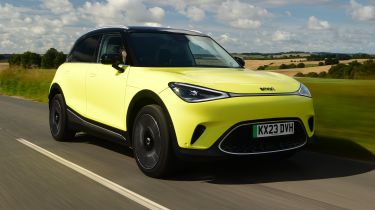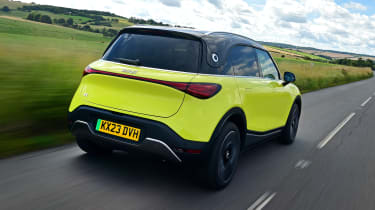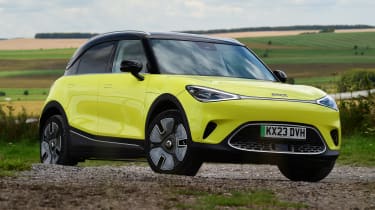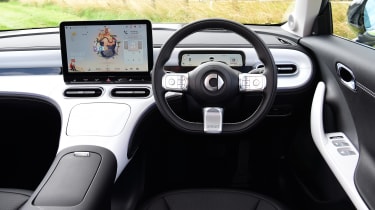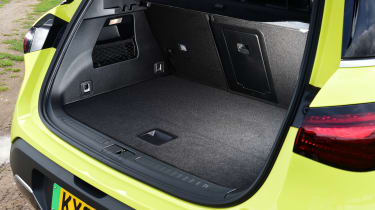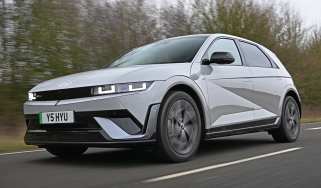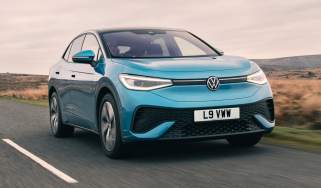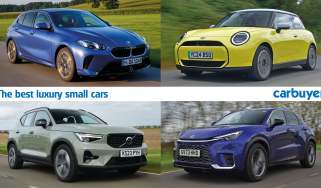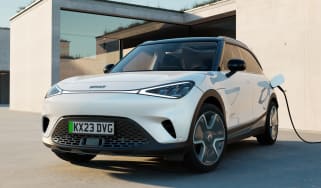Smart #1 review - a desirable small electric SUV
"The Smart #1 will be a desirable electric SUV for many; it’s not without merit, but it’s let down by poor infotainment software"
Pros
- Refined and comfortable
- Range and charging speeds
- Quirky styling
Cons
- Frustrating infotainment
- Limited smartphone connectivity
- Expensive
Verdict - Is the Smart #1 a good car?
Smart has changed tack, coming out with a mid-sized electric SUV instead of the small city cars it’s been famous for in the past. The #1 is roughly twice the size and twice as powerful as an EQ ForTwo, but is it twice as good? It will certainly broaden the Smart brand’s appeal to a host of new buyers, thanks to a plush and practical interior along with brisk acceleration. However, it also feels slightly lacking in some areas, such as its difficult-to-judge regenerative braking feel and frustrating infotainment graphics with menus that look a little tacky and childish.
Smart #1 models, specs and alternatives
Smart reinvented itself with the #1 model – pronounced ‘hashtag one’ – which represents a big contrast to the tiny city cars the brand was known for in the past. It’s a fully-electric SUV which is now the smallest car in the Smart range, sitting below the larger #3 SUV.
Smart is now under the ownership of Mercedes and Geely – you may not have heard of the latter, but as the Chinese parent company of Volvo, Polestar and Lotus, it has amassed a lot of experience manufacturing electric cars of late.
The Smart #1 is similar in size to a Kia Niro EV, Hyundai Kona Electric or Renault Megane E-Tech, so four tall adults should be able to sit comfortably inside. The Smart #1 shares many of its underpinnings with the upcoming Volvo EX30, which is set to be that brand’s most affordable electric car.
It’s fairly powerful for a car of its size, with even the standard version getting 268bhp from its rear-mounted electric motor – that’s enough to get it from 0-62mph in a lively 6.7 seconds – quicker than a Volkswagen ID.3. For speed freaks, there’s an even more powerful Brabus version with dual motors and 422bhp.
Under its skin, the #1 has a 66kWh battery (62kWh of which is usable), for a driving range of up to 273 miles with a single motor in Premium trim. This puts the Smart ahead of a Peugeot E-2008, but behind the Niro EV’s range figure. The #1 can charge quickly, reaching a maximum of 150kW at compatible DC public stations for a 10-80% top-up in less than 30 minutes.
Expect plenty of equipment, even with the entry-level Pro+ trim costing from around £36,000. This gets a 12.8-inch touchscreen and 9.2-inch driver’s display, 19-inch alloy wheels, LED headlights, a panoramic glass roof, artificial leather upholstery and heated seats, with a range of up to 260 miles.
Higher-end trim levels include Premium and Brabus – the first 100 #1s arriving in the UK will be Launch Edition models, which are based on Premium spec and get a white paint colour contrasted with a gold roof with a unique chequered pattern, unique 19-inch alloy wheels and two-tone leather upholstery, starting from just under £40,000.
Unfortunately the infotainment software is frustrating, with too many presses required for common functions, for a poor user experience. It’s a shame, as the Smart #1 is refined and comfortable, with a spacious interior given its crossover size. Its sliding rear seat is a nice feature, and the #1 feels like a high-quality product, but we urge you to see if you can live with its infotainment before signing up for a multi-year leasing deal.
Range, charging & running costs
All versions of the #1 come with a 66kWh battery (62kWh usable). In entry-level Pro+ trim, this can provide an official range figure of up to 260 miles on a single charge. In Premium models this increases to 273 miles, thanks to a silicon carbide inverter and heat pump, which the brand says increases efficiency and response.
That 273-mile range figure is almost identical to the most efficient version of the BMW iX1, and higher than the Volvo XC40 Recharge and Mercedes EQA. It should be perfectly acceptable for most EV buyers, but some models like the Tesla Model Y and Skoda Enyaq iV can go further. The Brabus version is slightly less efficient, managing 248 miles in ideal conditions.
It is possible to charge at a maximum rate of 150kW using a DC public charger, taking under 30 minutes to take the battery from 10 to 80%. A full charge from a 7.4kW home wallbox takes around 10 hours, but Premium and Brabus versions of the Smart #1 also support speeds of up to 22kW AC where available, reducing this to under three hours.
With considerable performance and technology, we’d expect the #1 to be rather pricey to insure, but it also qualifies for free VED (road tax), low Benefit-in-Kind taxation for company car drivers and free entry into zero-emissions zones.
Electric motor, drive & performance
The #1 has 268bhp from its rear-mounted electric motor, which is more than double the power of existing Smart models. It feels plenty for the sort of buyers likely to be tempted by an SUV in its class, with instant get up and go away from traffic lights – 0-62mph takes 6.7 seconds. Even on the motorway there’s enough power at higher speeds to pass slower traffic.
The accelerator is linear as you accelerate, so it’s easy to get up to speed smoothly, but the feel of the brake regeneration might need some more fine-tuning. There’s a delay as you lift off the throttle before regen kicks in, making it difficult to coast smoothly. There are two levels of regen, along with a one-pedal driving mode.
Most recently, we drove the Premium model of the Smart #1 in the UK with the 268bhp rear-mounted electric motor. Unfortunately the suspension setup and 19-inch alloys fitted to our test car resulted in a bumpy ride at lower speeds, and the #1’s responses make it feel heavy. At higher speeds, however, the car feels more comfortable. There isn’t much in the way of feel from the steering, but it’s at least precise and naturally weighted.
The regenerative braking settings are also confusing to navigate. There is an option between a low or high regeneration mode, but not for ‘one pedal’ driving – for that you have to look elsewhere in the system settings to find an ‘e-pedal’ mode, which will then bring the car to complete standstill when activated. Even then, there’s a significant delay when you lift off the accelerator until the regenerative braking kicks in, so it’s hard to regulate your speed using this alone.
There’s not denying, however, that the Smart #1 is a quick car, being capable of a swift 6.7-second 0-62mph time. It’s an easy car to drive on the motorway, with punchy acceleration when you need it, and in this environment it felt pretty refined, with only minimal whine from the electric motor.
We’ve also tried the #1 Brabus, which boasts 422bhp and four-wheel drive thanks to its dual electric motors. It’s certainly quick, racing towards its limited top speed of 112mph, but the chassis can struggle to cope with its extra power. 0-62mph takes just 3.9 seconds, putting this Smart #1 Brabus very close to super SUVs like the Lamborghini Urus, while easily out-sprinting the Renault Megane E-Tech and BYD Atto 3.
One thing we liked about driving the #3 was the reversing camera. Its high resolution makes produces a clear image on screen, and there’s a useful feature which tells you the distance you are away from an object in centimetres.
Interior & comfort
Sitting behind the wheel of the Smart #1 feels snug for the driver because of the high centre console, but as a whole, the cabin feels light and airy, especially when specced with the white dashboard. As you’d expect from a company like Smart, the interior has a techy feel that’s dominated by a large 12.8-inch infotainment display mounted atop the dashboard. This looks rather like a tablet, and it controls everything from the sat nav to media and the car’s climate control.
While it’s certainly responsive, the infotainment is also the worst part of the interior experience, with an interface that tries to be fun, but ends up looking a bit too childish and even features an animated fox. Some might find the little mascot charming, but we’d be happier without it. There’s a spinning planet graphic for the menu on the homepage, but while it looks unique, it isn’t the most intuitive layout to use.
There’s simply too much going on, the navigation is poor, windows obscure other items and options are buried in sub-menus. We also found spelling mistakes, and trying to activate key functions like single-pedal driving was infuriating. Originally there was no integration with Apple CarPlay and Android Auto, but from September 2023 cars come with this compatibility.
Elsewhere we have mixed feelings about the interior. Smart has used sturdy and attractive materials in places, such as the soft pad on the inside edge of the dash to rest your knee, but in other areas the plastics let down the premium feel.
The Smart #1 comes in a range of trims, starting from entry-level Pro+, with Premium and Brabus sitting above it. Pro+ models get a 12.8-inch touchscreen with Apple CarPlay and Android Auto, panoramic sunroof, adaptive cruise control, heated seats, a 360-degree camera, LED lights and a powered tailgate. Premium adds an upgraded Beats sound system, a head-up display, matrix LED headlights, wireless phone charging and a parking assist feature.
Brabus models get a full bodykit to give a sportier look to match its high-performance four-wheel drive system, plus an alcantara steering wheel, suede seats and headrests with the Brabus motif, and red seat belts and metal pedals.
Practicality & boot space
While Smart traditionally majored on city cars so space-efficient that two could fit in a single parking bay, the #1 is an altogether different proposition. The brand has moved with the times, and this BMW iX1 rival is a roomier crossover.
The advantage is a long interior, so there’s plenty of space for four adults to sit inside – it feels much roomier than a Renault Megane E-Tech in terms of knee, head and elbow room. Rear headroom is copious, even with the panoramic roof specified, and there’s almost no central hump in the floor. This means a smaller adult or child could also sit in the middle back seat and still have a space for their legs and feet.
Its handiest feature is a sliding rear seat that can move by 13cm to improve passenger space or increase boot capacity. Minimum figures are 323 litres for the Pro+ trim and 313 litres with a subwoofer fitted, but while these are down on most rivals, they can be boosted by sliding the seat forwards. It feels more usable than the boot space of rivals, too, with a wide rear opening and square load area. Fold down the rear seats and there’s up to 976 litres available up to the window line. There’s even more space under the boot floor, so there’s more room for items than at first glance. There’s also a ‘frunk’, but measuring just 15 litres in size, it’s only really useful for cable storage.
Reliability & safety
While Smart used to be related to Mercedes, the #1 shares more with Volvo and Polestar. Volvo came 13th in our 2023 Driver Power survey, down from eighth place the year before, and has a slightly worse than average 27% of respondents reporting a fault with their car in the first year.
It’s too soon to say how reliable the #1 will prove, but it’s likely most early niggles will crop up with the infotainment and electronics, as Geely has plenty of experience producing EVs.
As you’d expect for a brand new model, it comes with some pretty advanced safety features. Its suite of driver aids are dubbed ‘Smart Pilot’, which includes adaptive cruise control that can drive the #1 in traffic jams, blind-spot monitoring, self-parking and adaptive headlights.
Which Is Best?
Cheapest
- Name200kW Pure 49kWh 5dr Auto
- Gearbox typeAuto
- RRP£29,950
Most Economical
- Name200kW Pro + 66kWh 5dr Auto
- Gearbox typeAuto
- RRP£36,950
Fastest
- Name315kW Brabus 66kWh 5dr Auto AWD
- Gearbox typeAuto
- RRP£44,950
